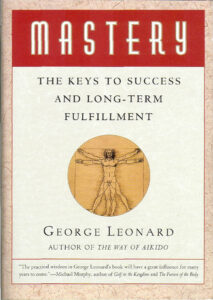
Question More, Action Knowledge.
Remember, at QMAK, we don’t just teach; we empower. We don’t just inform; we inspire. We don’t just question; we act. Become a Gold Member, and let’s unlock your child’s full potential, one question at a time.

As homeschooling parents, we have the profound responsibility and privilege of guiding our children on a lifelong journey of learning, growth, and self-discovery. We want to empower them to reach their highest potential, not just in academics, but in all areas of life. In his illuminating book, Mastery, George Leonard offers invaluable insights into the mindset and practices necessary to achieve true mastery in any field.
By incorporating his wisdom into our homeschooling approach, we can help our children develop the resilience, commitment, and love of learning they need to navigate the path of mastery with grace and joy.
At the core of Leonard’s philosophy is the idea that mastery is not about perfection or quick results, but rather a lifelong journey of dedicated practice and incremental progress. As he writes, “We fail to realize that mastery is not about perfection. It’s about a process, a journey. The master is the one who stays on the path day after day, year after year. The master is the one who is willing to try, and fail, and try again, for as long as he or she lives.”
By helping our children embrace this long-term perspective and cultivate a love of the learning process itself, we empower them to stay the course even when faced with challenges, plateaus, or setbacks. Leonard emphasizes that on the master’s journey, the most important learning and development takes place during extended periods on the plateau, not just in moments of breakthrough progress. At QMAK, our philosophy of “Question More, Action Knowledge” aligns perfectly with Leonard’s emphasis on staying on the path with patient, dedicated effort. Encourage your child to approach their studies and pursuits with a spirit of curiosity, experimentation, and resilience, focusing on the joy of the journey rather than just the destination.
One of the key insights Leonard offers is the importance of understanding and embracing the reality of plateaus on the path to mastery. He explains that in any learning process, we inevitably experience periods where our progress seems to stall, and we may feel stuck or frustrated. However, these plateaus are not obstacles to be overcome, but rather essential stages of integration and refinement. “To love the plateau is to love the eternal now, to enjoy the inevitable spurts of progress and the fruits of accomplishment, then serenely to accept the new plateau that waits just beyond them,” Leonard writes. By teaching our children to appreciate the plateaus and find satisfaction in the consistent practice required to navigate them, we help them develop the patience, persistence, and intrinsic motivation necessary for long-term success.
Leonard also stresses the transformative power of making one’s pursuits a regular practice, as distinguished from an occasional hobby or goal-oriented activity. Practice is done for its own sake, not to achieve something else. He relates it to the path (or Way) itself: “A practice (as a noun) can be anything you practice on a regular basis as an integral part of your life—not in order to gain something else, but for its own sake.” By helping our children identify and cultivate practices they truly love, whether in academics, the arts, sports, or personal development, we empower them to make learning and growth a fundamental part of who they are. Encourage them to approach their chosen practices with a spirit of dedication, consistency, and joy, focusing on the inherent rewards of the activity itself.
The five “master keys” Leonard describes—instruction, practice, surrender, intentionality, and the edge—provide powerful tools for our children’s lifelong mastery. Seeking out the best available instruction and mentoring, committing to diligent practice, surrendering to the learning process, maintaining mindful focus, and exploring the edges of one’s comfort zone all contribute to walking the path of mastery. We can model and encourage these keys in our homeschooling, enabling our children to embrace challenge and uncertainty as opportunities for “playing the edge” and expanding their abilities.
By embracing the timeless wisdom of Mastery and incorporating its principles into our homeschooling journey, we set the stage for our children to become lifelong learners, ever-evolving in their chosen pursuits and in their character. With consistent effort, an appreciation for the plateau, and a focus on the journey itself, they will develop the resilience, motivation, and love of learning to carry them through all stages of life. As Leonard reminds us, “What is mastery? At the heart of it, mastery is practice. Mastery is staying on the path.” Let us equip our children with the navigational tools and mindset to travel this transformative path with grace, meaning, and joy.

Remember, at QMAK, we don’t just teach; we empower. We don’t just inform; we inspire. We don’t just question; we act. Become a Gold Member, and let’s unlock your child’s full potential, one question at a time.